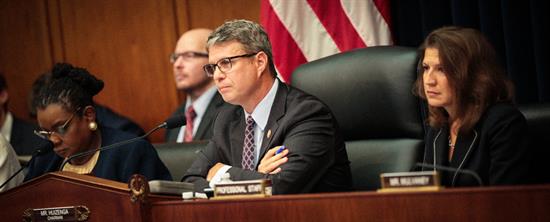Fed Officials Warn Against Changes to Politicize Monetary Policy
Washington,
September 7, 2016
WASHINGTON – Witnesses appearing before the Subcommittee on Monetary Policy and Trade at a hearing on Wednesday warned that reforms to the Federal Reserve System sought by liberals would politicize monetary policy deliberations and threaten the Fed’s independence in the conduct of monetary policy. “The Fed’s public-private structure supports monetary policy independence by ensuring a measure of apolitical leadership,” said Jeffrey Lacker, President and Chief Executive Officer of the Federal Reserve Bank of Richmond. “The Federal Reserve’s unique public-private structure…is designed to provide a system of checks and balances,” said Esther George, President and Chief Executive Officer of the Federal Reserve Bank of Kansas City. “Altering this public-private structure in favor of a fully public construct…risks putting more distance between Main Street and the nation’s central bank.” Speaking about the House-passed FORM Act (Fed Oversight and Reform) and the Financial Services Committee’s Financial CHOICE Act (Creating Hope and Opportunity for Investors, Consumers and Entrepreneurs), Subcommittee Chairman Bill Huizenga (R-MI) said, “I know that a better way is available – one that reverses the increased centralization of monetary policy in Washington’s politicized Board of Governors, and restores the historic role of District Banks as a critical source of local economic information and an institutional source of support for sound monetary policy.” Both the FORM Act and the Financial CHOICE Act include reforms that would make the Fed more accountable and transparent and strengthen its monetary policy independence. Key Takeaway from the Hearing:
Additional Topline Quotes from Witnesses: “The presence of bankers on Reserve Bank boards is said to represent a conflict of interest since Reserve Bank staff supervise banks. But strict rules limit bankers’ roles; they simply have no avenue through which they can influence supervisory matters. Moreover, best practice for any board is to seek members with expertise relevant to the organization’s activities. The Fed’s large payment processing operations make the original rationale for having bankers serve on Reserve Bank boards still valid. In addition, bankers are particularly well-positioned to report on economic conditions in their footprints. In conclusion, while some claim that the Federal Reserve’s governance structure is a historical anachronism, the continued relevance of the trade-offs taken into account by the authors of the Federal Reserve Act argues for the continued utility of the finely balanced arrangements they crafted.” - Jeffrey M. Lacker, President and Chief Executive Officer, Federal Reserve Bank of Richmond “The capital stock supplied by these member banks serves as the foundation for the decentralized structure allowing for separate corporate entities. Through the regional Reserve Banks, private citizens from diverse backgrounds and from the largest to the smallest communities have input into national economic policy; strong and varied independent perspectives more easily emerge to engage in difficult monetary policy discussions; and the central bank is provided insulation from short-term political pressures.” - Esther George, President and Chief Executive Officer, Federal Reserve Bank of Kansas City “As representatives of our region, we serve a limited yet crucial role. This includes providing detailed, systematic and real-time input about local economic conditions, which serves to help shape effective monetary policy. We also play a vital role in the business side of running a Reserve Bank, including management, strategic plans, operations, budgets and supervising internal audit functions.” - Robert G. Jones, Chairman and Chief Executive Officer of Old National BanCorp and former board director of the Federal Reserve Bank of St. Louis ### |


